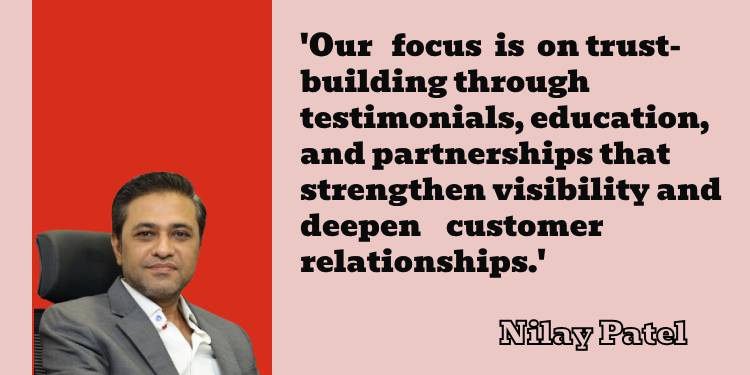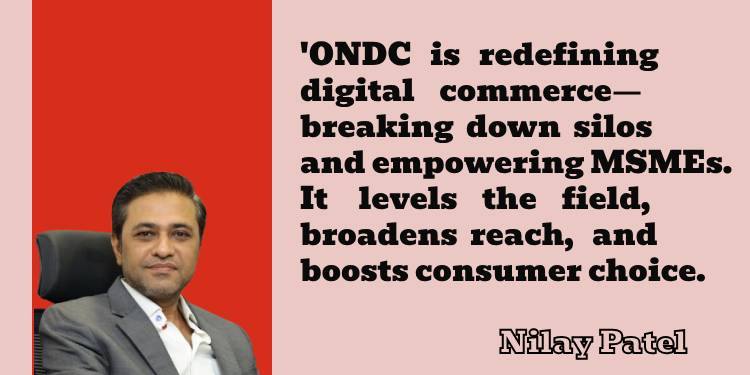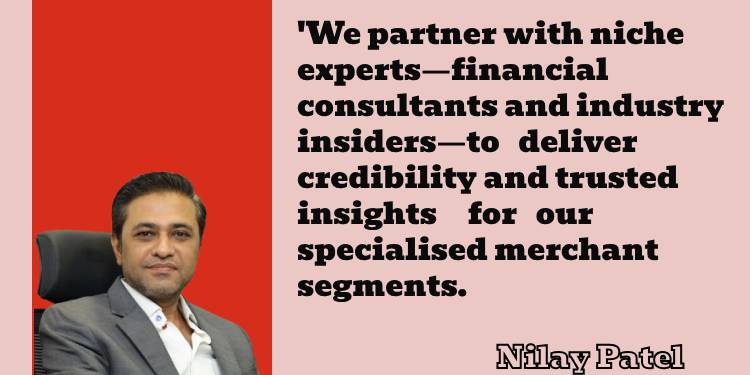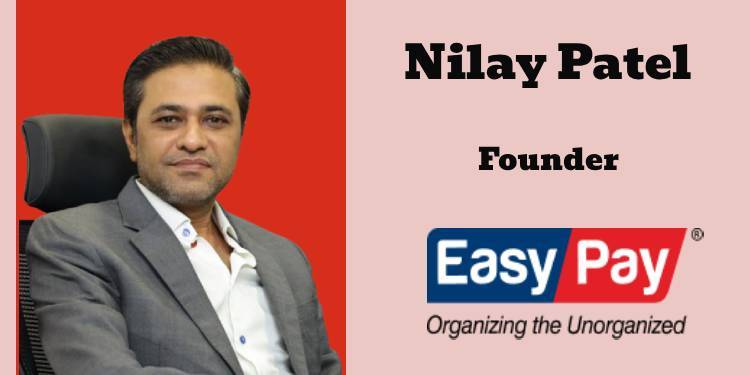EasyPay, a fintech solution company and one of the first fintech companies to go onboard ONDC for offering both Retail and Financial Services integration solutions, is a decade old premier Fintech company where cutting-edge technology meets financial innovation. As a fintech company, they look to create an impact in the way people manage, invest, and interact with money.
Through their platforms and tailored solutions, they empower individuals and businesses to navigate the complexities of finance with ease. At the intersection of finance and technology, they specialise in revolutionising the borrowing experience for individuals and businesses alike. Their platform offers access to flexible, transparent, and personalised lending options tailored to your unique needs.
Whether one is seeking a loan for personal growth, business expansion, or unexpected expenses, they’re here to provide fast, fair, and frictionless solutions. Backed by advanced algorithms and data-driven insights, they prioritize affordability, transparency, and convenience, ensuring a hassle-free borrowing process from application to repayment. From seamless payment processing to personalised investment strategies, they are committed to delivering exceptional experiences and driving financial empowerments for all.
Medianews4u.com caught up with Nilay Patel, Founder, Managing Director, EasyPay
Q. From a marketing point of view what are going to be the focus areas and priorities for EasyPay in 2025?
In the dynamic fintech landscape of 2025, marketing priorities will center on building unwavering trust and delivering hyper-personalized experiences. Given the sensitive nature of financial services, establishing credibility through robust security measures and transparent communication is paramount.
Simultaneously, leveraging AI to tailor solutions and offers to individual customer needs will be crucial for fostering engagement and loyalty. Marketing strategies will emphasize seamless integration within the broader digital ecosystem, highlighting the convenience of mobile-first solutions and the value of data-driven insights.
Furthermore, EasyPay will prioritise educating consumers on complex financial topics, thereby solidifying their position as trusted advisors. Ultimately, success will hinge on a blend of technological innovation, regulatory compliance, and a customer-centric approach that prioritizes security, personalisation, and seamless user experiences.
Q. What marketing activities can we expect in the coming months as EasyPay looks to deepen market penetration?
In the coming months, EasyPay’s marketing activities will likely focus on aggressive digital campaigns designed to broaden its reach and deepen market penetration. Expert targetted social media advertising, particularly on platforms frequented by its key demographics, emphasising the speed, security, and ease of use of its payment solutions.
Content marketing, including blog posts, webinars, and explainer videos, will educate potential customers on the benefits of EasyPay’s services, especially within the high-risk merchant space. Strategic partnerships with e-commerce platforms and other relevant online businesses will drive co-branded promotions and referral programs. Look for increased emphasis on customer testimonials and case studies, building trust and demonstrating EasyPay’s reliability.
Additionally, targetted email campaigns and promotional offers will aim to convert leads and encourage repeat business, while a focus on SEO optimization will ensure EasyPay remains visible to those searching for payment processing solutions.

Q. What are the key fintech trends expected in 2025 and what role will EasyPay play in this?
In 2025, key fintech trends will revolve around the increased integration of AI for personalised financial services, the expansion of embedded finance into non-financial platforms, and the continued surge of mobile-first payment solutions. EasyPay, with its focus on high-risk merchant services and digital payment processing, is poised to play a significant role.
Its emphasis on secure, reliable transactions will be crucial as businesses navigate the complexities of these evolving trends. EasyPay can leverage AI to enhance fraud detection and provide tailored payment solutions for its diverse clientele, particularly those in high-risk sectors.
By fostering seamless integration with e-commerce platforms and mobile wallets, EasyPay will capitalise on the embedded finance trend, offering convenient payment options within existing consumer journeys. Furthermore, by focussing on mobile payment optimisation, EasyPay will cater to the growing demand for frictionless, on-the-go financial transactions, solidifying its position as a key player in the evolving fintech landscape.
Q. What role is AI playing in helping EasyPay offer better solutions and also in terms of content creation?
AI is becoming integral to EasyPay’s strategy, both in enhancing its service offerings and streamlining content creation. By analysing transaction data, AI algorithms can detect and prevent fraud more effectively, leading to safer and more reliable payment processing for EasyPay’s high-risk merchant clientele.
Furthermore, AI-powered personalisation enables EasyPay to tailor payment solutions and customer support based on individual business needs, improving overall user experience.
In terms of content creation, AI tools can automate the generation of marketing materials, such as social media posts and email campaigns, freeing up human resources for more strategic tasks. AI can also assist in analysing content performance, providing insights into which messages resonate best with target audiences.
This data-driven approach allows EasyPay to optimise its content strategy, ensuring that its marketing efforts are both efficient and effective, ultimately driving market penetration and customer engagement.

Q. How is the government-backed Open Network for Digital Commerce (ONDC) leveling the playing field?
The government-backed Open Network for Digital Commerce (ONDC) is designed to democratise e-commerce by breaking down the platform-centric silos that have historically favoured large corporations. By establishing an open, interoperable network, ONDC allows buyers and sellers to connect regardless of the platform they use.
This levels the playing field for Micro and medium-sized enterprises by providing them with access to a wider customer base and reducing their reliance on dominant marketplaces. Consumers benefit from increased choice and price transparency, as they can discover products and services from a diverse range of sellers within a unified network.
Essentially, ONDC fosters a more inclusive and competitive digital marketplace, empowering smaller businesses and providing greater value to consumers, thereby disrupting the dominance of large e-commerce players.
Q. How does EasyPay plan to contribute to financial inclusion especially to the MSME sector?
EasyPay aims to contribute significantly to financial inclusion, particularly within the MSME sector, by providing accessible and reliable digital payment solutions.
Recognising the challenges faced by MSMEs in accessing traditional financial services, EasyPay focuses on streamlining payment processing, offering secure transaction gateways, and facilitating seamless integration with various digital platforms.
By simplifying payment acceptance and management, EasyPay empowers MSMEs to participate more effectively in the digital economy, expand their customer base, and enhance their operational efficiency. Moreover, by focusing on high-risk merchant accounts, EasyPay is able to bring financial services to sectors that are often excluded by traditional institutions. Through these efforts, EasyPay seeks to bridge the financial inclusion gap, enabling MSMEs to thrive and contribute to broader economic growth.
Q. How important are roadshows and seminars for EasyPay?
Roadshows and seminars are highly valuable for EasyPay, particularly in the high-risk merchant services sector, where building trust and establishing expertise are paramount. These events provide a crucial platform for direct engagement with potential and existing clients, fostering personal connections and demonstrating EasyPay’s commitment to understanding and addressing specific business needs.
Seminars offer opportunities to educate merchants on complex regulatory landscapes, fraud prevention strategies, and the benefits of tailored payment solutions, solidifying EasyPay’s position as a knowledgeable industry leader. Roadshows, by bringing EasyPay’s services directly to target markets, enable the company to reach a wider audience, especially in regions where digital marketing alone may not be sufficient.
This face-to-face interaction allows for immediate feedback, addressing concerns, and building strong relationships, ultimately driving customer acquisition and bolstering EasyPay’s brand reputation within the MSME and high-risk business communities.
Q. Does influencer marketing have a role to play for EasyPay?
While traditional influencer marketing might not be the primary driver for EasyPay, it does hold a strategic role, particularly in building trust and credibility within specific niche markets.
Rather than focussing on broad-reach lifestyle influencers, EasyPay can leverage industry experts, financial consultants, and respected figures within the high-risk merchant sectors it serves.
These “micro-influencers” can provide authentic endorsements, share valuable insights on payment processing best practices, and address the specific concerns of EasyPay’s target audience. Additionally, partnerships with respected business publications or financial technology bloggers can create valuable content that highlights EasyPay’s expertise and reliability.
This targetted approach to influencer marketing can help EasyPay establish itself as a trusted and knowledgeable partner, driving brand awareness and customer acquisition within its core customer segments.

Q. Data privacy is a concern for consumers and businesses. How does EasyPay protect this?
Data privacy is a significant concern for both consumers and businesses, especially in the digital age where sensitive information is frequently shared online. EasyPay addresses these concerns by implementing robust security measures to safeguard user data.
This includes encryption protocols to protect data during transmission, secure storage solutions to prevent unauthorised access, and regular security audits to identify and address potential vulnerabilities.
Additionally, EasyPay adheres to strict compliance standards, such as GDPR and other relevant regulations, ensuring that user data is handled transparently and responsibly. By prioritising privacy and security, EasyPay builds trust with its users and ensures that their personal and financial information remains protected.

















